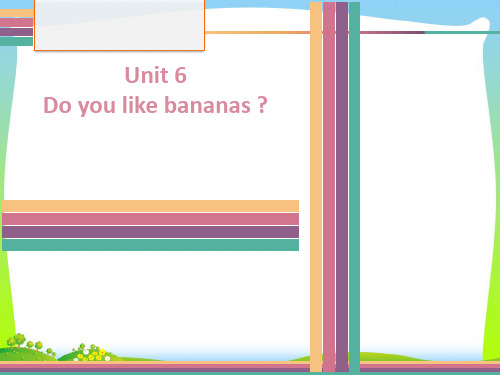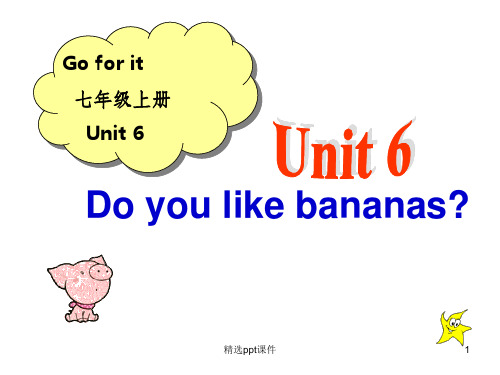人教版新目标版七年级上册英语第六单元unit6课件PPT
合集下载
七年级英语上册 Unit 6 Do you like bananas(第5课时)Section B(2a-3b)课件 (新版)人教新目标版

二、根据句意及汉语提示写单词。
6.Dale's brother _w_a_n__ts_(想要) an apple. 7.My son has good eating _h_a_b_i_t_s (习惯). 8.Fruit and vegetables are __h_e_a_lt_h_y_(健康的) food. 9.You can ask me some __q_u_e_s_ti_o_n_s_(问题). 10.The picture is __r_e_a_ll_y__(真正地) nice.
Unit 6 Do you like bananas?
第五课时 Section B(2a~3b)
1.Sports star eats well.体育明星吃得好。 (1)sports star体育明星。 (2)eats是eat的第三人称单数形式。在一般现在时中,当主语是 第三人称单数,就用动词的第三人称单数形式。 (3)well adv.好,主要用于修饰动词。 2.ask sb. about sth.向某人询问某事 3.her eating habits她的饮食习惯 此处eating作定语。eg: I have good eating habits.我有好的饮食习惯。
4.healthy 形容词,意为“健康的”,其名词形式为health,其反义词为 unhealthy。 5.I don't want to be fat.我不想长胖。 want“要,想要”,常用结构有:want sth.“想要某物”;want to do sth.“想做某事”,want sb. to do sth.“想要某人做某事”。 6.What do you like for breakfast?你早餐喜欢什么? (1)for 介词,意为“为了,给”,在句型“have…for breakfast/lunch/dinner”中表示“某人吃什么。” (2)breakfast前面不能用冠词,一日三餐前一般不加冠词。
人教新目标英语七年级上Unit 6 Period 2课件

vegetables amount fruit amount others amount
an apple
three apples
a strawberry
some strawberries
one tomato
many tomatoes
a glass of milk
two glasses of milk
a bowl of rice
two bowls of rice
John’s shopping list
vegetables amount fruit amount others amount
tomatoes carrots
3 apples 4
milk
2
glasses
3
hamburgers 4
Let’s have a summary of grammar rules now.
Unit 6 Do you like bananas?
( Period 2 )
Learning Objectives
By the end of this class, you will be able to • tell the differences between countable and
uncountable nouns. • change countable nouns into plural forms.
Countable nouns
grapes oranges tomatoes kiwis apples eggs nuts
Uncountable nouns
a jug of milk a chunk of cheese some butter a bottle of wine fusilli (意大利螺旋面)
新目标英语新教材七年级上册 Unit 6 Section A(1a—2e) PPT课件

get dressed
brush his teeth
have breakfast at home
1c
Listen to the second conversation. Why are Peter and Han Lin at school early? Match
the names with the reasons.
Ask a partner about his or her school day routine.
2e Then give a report.
get up have breakfast go to school have class play sport have lunch go home do homework brush teeth have dinner take a shower go to bed
Tom’s activity get up
have breakfast go to school
go home play basketball
have dinner do his homework
go to bed
2d Listen to the conversation again and pay attention to the stressed words. Then role-play the conversation.
Tom:I have breakfast at about ten past seven . Then I go to school at 7:50.
Lu Jiaqi: When do you go home?
Tom: Around five
.
人教版新目标七年级上册Unit 6 Do you like bananas课件

Fruits
pear banana orange
strawberry
pear banana
orange
strawberr
5
Vegetables
tomato
tomatoes
carrot
carrots
6
s
salad
ice-cream 7
Test: Who has the best eyes? 谁的眼睛最亮?
Tom: I think John likes strawberries and apples. Bill: OK. _L_et_’s_h_a_v_e___ strawberries and apples then.
I'm Eric.
I
ice-cream.
But
salad.
He's Eric. He likes ice-cream . But he doesn't like salad.
B:No, I don't.
3 A:Do you like oranges?
B:Yes, I do.
1 添加文本
A: Do you like bananas?
B: Yes, I do. 添加文本
2b Listen again. Fill in the blanks.
tomatoes
ice cream ice cream
课题:Unit 6 Do you like bananas? 学科:初中英语 版本:人教版七年级上册 ]
学习目标
learning aims
1 To master the names of fruit and other food. 2 To talk about likes and dislikes . 3 To learn to enjoy a healthy life.
初中人教版新目标英语七年级上册课件Unit6-SA

过去时态
描述已经发生的动 作或状态
形容词和副词
形容词的用法
用于描述名词的特征或性质
副词的用法
用于修饰动词、形容词或其他 副词
比较级与最高级
用于比较不同事物的程度或水 平
01 常用介词
指在语言中常见的位置或方向的介词
02 连词的分类
连接句子内部或句子之间的词语
03 介词短语和连词短语的使用
在句子中起到修饰或连接的作用
能力。
提高理解能力
通过不断阅读和解 析文章,逐渐提高 对语言表达和逻辑 推理的理解能力。
阅读不同领域 的文章
拓展阅读领域,可 以帮助提高对不同 主题的理解能力,
增加知识面。
01 阅读报纸
通过阅读报纸了解时事动态,丰富知识储备,提高 对社会事件的了解能力。
02 阅读故事书
阅读故事书可以激发阅读兴趣,培养想象力,提高 语言表达能力。
Practice using the following sentences to improve your grammar skills: 1. I like playing football. 2. She goes to school by bus. 3. They have lunch at 12 o'clock.
happening at the moment
of speaking.
Comparative and Superlative DAesdcrjiebicntgitvhee dsegree of a
quality or characteristic in
relation to others.
句子练习
03
总结
通过交流互动这一环节,学生们不仅可以提高自己的口语表 达能力和演讲技巧,还能培养团队合作精神和自信心。这对 于学生们的成长和发展至关重要,也是英语学习的必经之路。
2021年人教版七年级上册Unit6 Saturday.ppt

(Section B 3a-Self Check)
(A)4. Which of the following is NOT true according to the passage? A. Children can grow strawberries on a farm. B. Farmers can teach children how to grow vegetables. C. Children can make ice-cream in an icecream Room. D. Children can make bread together in the DIY BREAD Room.
(Section B 3a-Self Check)
(B)2. People can take care of the vegetables ______ in a Vegetable Garden. A. on weekdays B. every day C. on weekends D. on Mondays (C)3. The underlined word “taste” means “______” in Chinese. A. 播种 B. 收割 C. 品尝 D. 种植
(Section B 3a-Self Check)
You can look after them on weekends or in your free time on weekdays. And you can taste them in summer or fall. Eating more vegetables is good for health②. ● Make yummy ice-cream in an ice-cream Room. There are all kinds of ice-cream for you to make, such as apple ice-cream,
人教版七年级上册Unit6完整ppt课件

hamburgers
tomatoes
ice-cream
ice-cream
to精m选aptpot课es件
16
Food
Name
tomatoes
I
Bill
Report:
I like tomatoes, ice-cream and salad. But I don’t like hamburgers or carrots.
11
bananas oranges strawberries
hamburgers
milk
ice-cream
Do you like bananas ? Yes,I do./No, I don’t.
bread tomatoes salad
精选ppt课件
12
Look and say
转换人称
A:D__o_es__he _li_k_e_ _st_r_a_w_b__er_r_i_e_s? B: No, _h_e_d_o_e_s_n_’_t_.
Grammar Focus
2. 是的。Y__e_s_, I __d_o_.
不,不喜欢。_N__o__, I __d_o_n__’t.
3. 他们喜欢梨吗?
D_o___ _t_h_e_y_ like pears?
4. 是的。Y__e_s_, they ___d_o.
不喜欢。N_o__, they __d_o_n__’t.
My friend Bill likes strawberries and milk. But he doesn’t like tomatoes or hamburgers.
精选ppt课件
17
2d
Read 2d. Then choose the right answers.
新目标英语七年级上unit6单元课件(好用)

The theme aims to introduce students to different cultures and traditions, as well as to enhance their understanding of the world.
Unit Objectives
Students will develop their speaking, listening, reading, writing, and grammar skills through this unit.
结合实际情境运用词汇和语法
VS
为了让学生更好地掌握和运用所学的 词汇和语法知识,教师可以设计一些 结合实际情境的练习和活动,如角色 扮演、情景对话等。通过这些活动, 学生可以在模拟的真实环境中运用所 学的词汇和语法知识,加深对语言的 理解和记忆。
The Application of Vocabulary and Grammar
Overview of Unit Content
• The unit will cover various festivals and celebrations, including traditional festivals like Chinese New Year, Diwali, and Oktoberfest, as well as modern festivals like Earth Day and Black History Month.
Writing style
Discuss the writing style used in the text, including the author's choice of words, sentence variety, and effective use of language.
Unit Objectives
Students will develop their speaking, listening, reading, writing, and grammar skills through this unit.
结合实际情境运用词汇和语法
VS
为了让学生更好地掌握和运用所学的 词汇和语法知识,教师可以设计一些 结合实际情境的练习和活动,如角色 扮演、情景对话等。通过这些活动, 学生可以在模拟的真实环境中运用所 学的词汇和语法知识,加深对语言的 理解和记忆。
The Application of Vocabulary and Grammar
Overview of Unit Content
• The unit will cover various festivals and celebrations, including traditional festivals like Chinese New Year, Diwali, and Oktoberfest, as well as modern festivals like Earth Day and Black History Month.
Writing style
Discuss the writing style used in the text, including the author's choice of words, sentence variety, and effective use of language.
- 1、下载文档前请自行甄别文档内容的完整性,平台不提供额外的编辑、内容补充、找答案等附加服务。
- 2、"仅部分预览"的文档,不可在线预览部分如存在完整性等问题,可反馈申请退款(可完整预览的文档不适用该条件!)。
- 3、如文档侵犯您的权益,请联系客服反馈,我们会尽快为您处理(人工客服工作时间:9:00-18:30)。
➢ Key sentences:
—Do you like bananas? —Yes, I do. — Do you like salad? — No, I don’t.
Lead in
Review
1. sports things 2.—Do you have…? — Yes, I do. /No, I don’t. — Does she/he have …? —Yes, she/he does. /
Countable nouns Uncountable nouns
可数名词
不可数名词
Countable and Uncountable nouns 可数/不可数 均可
hamburgers tomatoes French fries oranges bananas strawberries
3
Do you like oranges? Yes, I do.
Practice
1c Practice the conversations above with your
partner. Then make you own conversations.
A: Do you like bananas? B: Yes, I do.
Countable and uncountable nouns
chicken
ice cream
salad
Group work:
hamburgers tomatoes French fries oranges bananas tea strawberries bread apples carrots pears broccoli meat water milk eggs ice cream salad chicken vegetables
可数名词复数形式的构成 1
名词特点 词尾加法 词尾读音方法
例词
一般情况下
加-s
1. -s在清辅音后读[s]
desks
2. -s在浊辅音后读[z]
apples
3. -s在元音后读[z]
trees
4. 以音素[ s , z , , 读[iz]
]结尾的,
oranges
以-s, -x, -sh, -ch 结尾的
uncountable nouns
milk
tea meat
bread
既可数又不可数名词
定义:在某些情况下能计数,在某些情况下 不能计数的名词。
e.g. (1)a chicken 一只鸡 chicken 鸡肉
(2)an ice cream 一个冰淇淋 ice cream 冰淇淋(指成份)
(3)a salad 一碟沙拉 salad 沙拉(指成份)
a strawberry strawberries
a tomato tomatoes
课文展现
1a Match the words with the things in the picture.
1.hamburgers_d__ 2.tomatoes ___ 3.oranges ___
a
e
g
i
4.ice-cream ___ 5.salad ___
No, she/he doesn’t.
some sports things
basketball
volleyball ping-pong ball ping-pong bat
baseball bat soccer ball tennis ball
Presentation
Read and learn
七年级(上)
Unit 6
Do you like bananas?
Section A (1a-1c)
学习目标
➢ Key words & phrases:
banana, hamburger, tomato, ice-cream, salad, strawberry, pear, milk, bread
无生命的事
物加-s
-ies读[iz] -s读[z] -es读[z] -s读[z]
families dictionaries
boys keys
tomatoes potatoes
photos radios
countable nouns
a hamburger
hamburgers
an orange
three oranges
New words & Phrases
food names
orange
banana
strawberry
tomato
pear
hamburger
salad
ice cream
milk
bread
a banana bananas
a pear pears
a hamburger hamburgers
an orange oranges
A: Do you like salad? B: No, I don’t.
A: Do you like oranges? B: Yes, I do.
Grammar
可数名词和 不可数名词
可数名词
(1)定义:是可以计数的名词。 (2)可数名词前可以用 a , an 限定,表一个….。 (3)可数名词前可以用 one, two , three… 限定。 (4)可数名词有复数形式。
h
6.bananas ___
7.strawberries ___
c
8.pears ___
b
k ___
f
10.bread ___
j
1b Listen and number the conversations[1-3].
Do you like salad? 2 No, I don’t
Do you like bananas? 1 Yes, I do.
a tomato
five tomatoes
a strawberry four strawberries
不可数名词
(1)定义:是指不能计数的名词。 (2)不可数名词前不可以用 a , an 限定。 (3)不可数名词前不可以用 one, two , three… 限定。 (4)不可数名词没有复数形式。
加-es
-es读[iz]
以 f 或 fe 结尾的
改f或fe为v 再加-es
-ves读[vz]
boxes wat构成 2
名词特点 词尾加法 词尾读音方法
例词
以辅音字母 改y为i 再 加y结尾的 加-es
以元音字母
加y结尾的
加-s
有生命的事
物加-es
以o 结尾的
—Do you like bananas? —Yes, I do. — Do you like salad? — No, I don’t.
Lead in
Review
1. sports things 2.—Do you have…? — Yes, I do. /No, I don’t. — Does she/he have …? —Yes, she/he does. /
Countable nouns Uncountable nouns
可数名词
不可数名词
Countable and Uncountable nouns 可数/不可数 均可
hamburgers tomatoes French fries oranges bananas strawberries
3
Do you like oranges? Yes, I do.
Practice
1c Practice the conversations above with your
partner. Then make you own conversations.
A: Do you like bananas? B: Yes, I do.
Countable and uncountable nouns
chicken
ice cream
salad
Group work:
hamburgers tomatoes French fries oranges bananas tea strawberries bread apples carrots pears broccoli meat water milk eggs ice cream salad chicken vegetables
可数名词复数形式的构成 1
名词特点 词尾加法 词尾读音方法
例词
一般情况下
加-s
1. -s在清辅音后读[s]
desks
2. -s在浊辅音后读[z]
apples
3. -s在元音后读[z]
trees
4. 以音素[ s , z , , 读[iz]
]结尾的,
oranges
以-s, -x, -sh, -ch 结尾的
uncountable nouns
milk
tea meat
bread
既可数又不可数名词
定义:在某些情况下能计数,在某些情况下 不能计数的名词。
e.g. (1)a chicken 一只鸡 chicken 鸡肉
(2)an ice cream 一个冰淇淋 ice cream 冰淇淋(指成份)
(3)a salad 一碟沙拉 salad 沙拉(指成份)
a strawberry strawberries
a tomato tomatoes
课文展现
1a Match the words with the things in the picture.
1.hamburgers_d__ 2.tomatoes ___ 3.oranges ___
a
e
g
i
4.ice-cream ___ 5.salad ___
No, she/he doesn’t.
some sports things
basketball
volleyball ping-pong ball ping-pong bat
baseball bat soccer ball tennis ball
Presentation
Read and learn
七年级(上)
Unit 6
Do you like bananas?
Section A (1a-1c)
学习目标
➢ Key words & phrases:
banana, hamburger, tomato, ice-cream, salad, strawberry, pear, milk, bread
无生命的事
物加-s
-ies读[iz] -s读[z] -es读[z] -s读[z]
families dictionaries
boys keys
tomatoes potatoes
photos radios
countable nouns
a hamburger
hamburgers
an orange
three oranges
New words & Phrases
food names
orange
banana
strawberry
tomato
pear
hamburger
salad
ice cream
milk
bread
a banana bananas
a pear pears
a hamburger hamburgers
an orange oranges
A: Do you like salad? B: No, I don’t.
A: Do you like oranges? B: Yes, I do.
Grammar
可数名词和 不可数名词
可数名词
(1)定义:是可以计数的名词。 (2)可数名词前可以用 a , an 限定,表一个….。 (3)可数名词前可以用 one, two , three… 限定。 (4)可数名词有复数形式。
h
6.bananas ___
7.strawberries ___
c
8.pears ___
b
k ___
f
10.bread ___
j
1b Listen and number the conversations[1-3].
Do you like salad? 2 No, I don’t
Do you like bananas? 1 Yes, I do.
a tomato
five tomatoes
a strawberry four strawberries
不可数名词
(1)定义:是指不能计数的名词。 (2)不可数名词前不可以用 a , an 限定。 (3)不可数名词前不可以用 one, two , three… 限定。 (4)不可数名词没有复数形式。
加-es
-es读[iz]
以 f 或 fe 结尾的
改f或fe为v 再加-es
-ves读[vz]
boxes wat构成 2
名词特点 词尾加法 词尾读音方法
例词
以辅音字母 改y为i 再 加y结尾的 加-es
以元音字母
加y结尾的
加-s
有生命的事
物加-es
以o 结尾的
